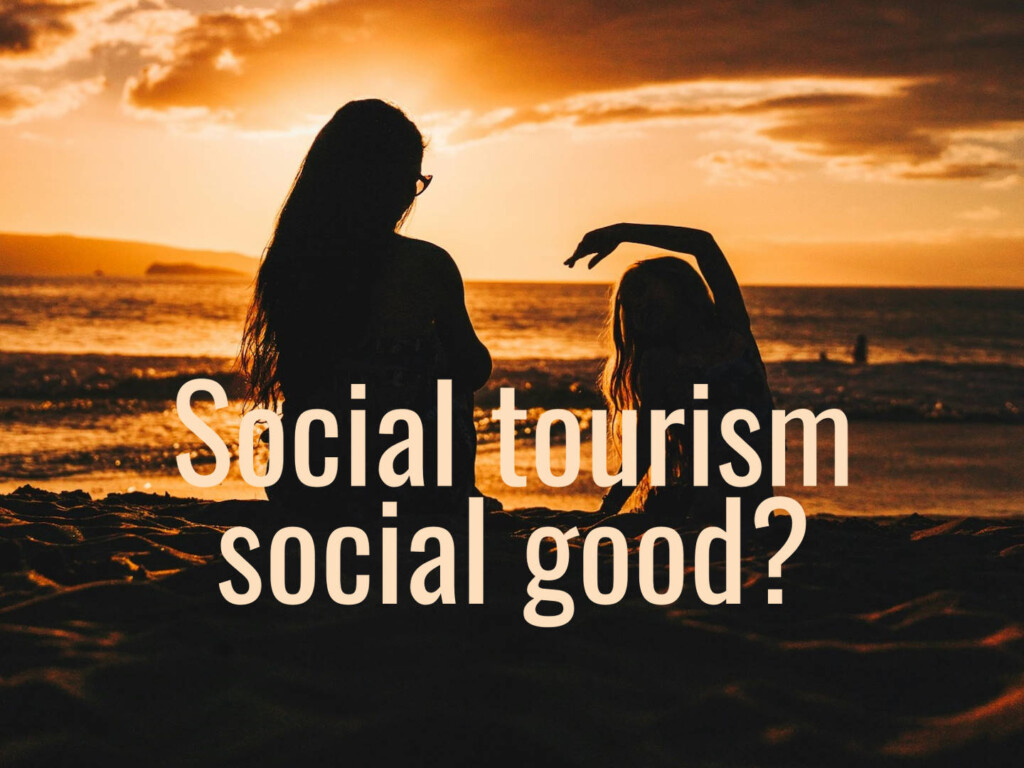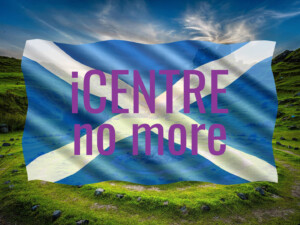The happiness factor: Social tourism is sustainable tourism

Can ‘social tourism’ — charity- and/or taxpayer-supported holidays — help alleviate stress in society and turn the travel & tourism industry’s off-season frowns upside down?
Scott McCabe thinks so.
Professor McCabe penned this “Good Tourism” Insight at the invitation of Tourism’s Horizon: Travel for the Millions, a “GT” Insight Partner.
[You too can write a “GT” Insight.]
Contents
Family holidays: A fine time …
Term-time holiday fines were back in the news in the United Kingdom, just before the long summer holiday season was about to begin. Fines levied by local councils on families who take their children out of school to go on a holiday were set to increase by GBP 20 (~USD 25.75), to GBP 80 (~USD 103) per pupil for five days of absence from August 1, 2024.
Media coverage included interviews with families more than willing to pay the increased fines, highlighting the crux of the issue: the vast differential between peak and off-peak holiday pricing. For families that can save hundreds or thousands of pounds on a holiday by switching to term-time dates, fines make little difference.
… if one can afford a holiday
The prices of both overseas and domestic holidays have risen substantially following the COVID-19 pandemic, as holiday companies try to recoup lost earnings and cover increased costs following the surge in energy prices caused by the war in Ukraine.
A study undertaken by TravelSupermarket in 2023 showed that the average price for the top five overseas destinations rose more than 30% compared to pre-pandemic rates, much faster than inflation, although 2024 prices have stabilised.
The link between attending school regularly and educational outcomes is well established. However, absence rates in England have risen significantly since the pandemic, leading to concerns about the effects on GCSE pass rates.
Yet, the importance of spending quality family time together is also not to be underestimated, and a holiday away from home creates long-lasting happy memories and is an important opportunity for families to spend time together in a more relaxed way. It could also lead to more positive engagement with education and learning.
… if one can afford a family
Another issue facing the new government as I write this is the potential revolt on the ‘two-child benefit cap’, which has thrust millions of children into poverty since its introduction.
The two issues are connected. They highlight the need for the newly-elected UK government to rethink its policies; to consider the right to leisure travel, the benefits of holidays for children and families, and the equal opportunity to participate in activities considered essential to modern family life.
These considerations are important aspects of what is called ‘social tourism’, which is concerned with supporting the inclusion of disadvantaged people.
What is ‘social tourism’?
My colleagues and I have defined social tourism as “all activities, relationships and phenomena in the field of tourism resulting from the inclusion of otherwise disadvantaged and excluded groups in participation in tourism. The inclusion of these groups in tourism is made possible through financial or other interventions of a well-defined and social nature.”
Social tourism was pioneered in France and Belgium, but there are many different variants across the world. Social tourism is gaining momentum in rapidly developing economies in Asia, South America, and beyond.
In the UK we have long-championed the ‘Tourism for All’ movement, which is mostly associated with access for people with disabilities. However, social tourism is a broader idea that covers a wider range of needs, including people living in poverty, underprivileged children, and older people.
Don’t miss other “Good Tourism” content tagged ‘accessible tourism’
In practice social tourism involves a range of measures. Most often it is expressed in terms of financial support to help people in disadvantaged groups afford a holiday. However, people and families living with disabilities or other forms of social disadvantage often have complex, multidimensional issues. For them affordability is often only one of the barriers.
Social tourism in the UK is organised mainly by small charities, such as Family Holiday Charity, which it claims supported more than 1,000 family holidays in 2023.
There are larger organisations working in the sector too, such as the Youth Hostel Association of England and Wales which offers targeted support to children, young people, and families to help them access the countryside and the cultural value of towns and cities.
Government is also involved, indirectly, through Visit England. The national tourism organisation supported the ‘England for Everyone’ project in 2022 and 2023 in partnership with Family Holiday Charity.
Social tourism: Sustainable tourism for the off season
Also in the news in the lead-up to summer holidays were the pressures facing popular destination cities and resorts across Europe. The intense demand for holidays in short seasonal peaks is unsustainable and creates problems for people living in these popular areas.
Social tourism is often considered to be more sustainable. Not only do customers rely on public transport to get to their domestic destinations, their holidays are generally off-peak, helping to spread demand throughout the year and providing a vital economic benefit to destinations at times when market demand is low.
Family Holiday Charity estimated that for every GBP 1 invested in social holidays in the England for Everyone project, more than GBP 4 was generated.
Where resources and infrastructure are in place, social tourism can be scaled up. In research that colleagues and I undertook in 2023 in Spain, which has had a government-backed social tourism for senior citizens programme in place since 1985, the de-seasonalising effect was also shown to be effective where there are high concentrations of social tourism holidaymakers.
The Spanish social tourism system supports almost 1 million people with subsidised package holidays to coastal resort destinations during the off-peak months between October and March each year. This activity contributes much to the economic vitality of resorts, helps secure jobs over the off season, reduces social security payments, and generates additional income for tourism and related service industries.
Spain’s investment in social tourism returns tax revenues from businesses and workers while decreasing social security payments to those who might otherwise be unemployed during the off season. The activity helps smooth out the peaks and troughs of market demand, and helps keep the destination open and available to the less reliable off-season demand from abroad.
Social tourism’s ‘happiness factor’
However, the most important benefit of social tourism is for the people who are supported.
Colleagues and I have undertaken research on social tourism that highlights “the happiness factor”, or the quality-of-life benefits derived from a simple break away from home — the benefits of social tourism on subjective well-being, social cohesion, relationships, family bonds, and the respite from challenging circumstances in daily life — such as the well-being outcomes of social tourism in Finland.
If the UK’s new government is serious about tackling social and health issues facing the country in the long-term, it will need to address how to get people economically active, feeling positive about their future, ensuring that their children attend school, and ensuring that opportunities are available to everyone in society.
One important plank in a joined-up policy environment is the oft-overlooked role that holidays play in contributing to individual health and well-being, family life, and social life more generally, and the flow on effects in communities. Social tourism offers an intriguing mechanism to stimulate sustainable economic activity in the visitor economy, while delivering wider social benefits to disadvantaged groups.
What do you think?
Share your own thoughts about social tourism in a comment below.
(SIGN IN or REGISTER first. After signing in you will need to refresh this page to see the comments section.)
Or write a “GT” Insight or “GT” Insight Bite of your own. The “Good Tourism” Blog welcomes diversity of opinion and perspective about travel & tourism, because travel & tourism is everyone’s business.
“GT” doesn’t judge. “GT” publishes. “GT” is where free thought travels.
If you think the tourism media landscape is better with “GT” in it, then please …
About the author

Scott McCabe is Professor of Marketing at Birmingham Business School, United Kingdom; Professor of Marketing and Tourism at the University of Eastern Finland; and Co-Editor in Chief of Annals of Tourism Research.
Prof McCabe’s research on tourist consumer behaviour and experiences has more recently broadened to include destination marketing, responsible consumption and ethics, as well as emotions and links between wellbeing and tourism.
Since 2006, Scott has worked on a programme of research on the motivations, experiences, and outcomes of holiday experiences for severely disadvantaged UK consumers. His research in association with the Family Holiday Charity, and with a range of other charities, helped to promote the concept of ‘social tourism’ in the UK.
Professor McCabe is a “Good Tourism” guest author at the invitation of Tourism’s Horizon: Travel for the Millions, a “Good Tourism” Insight Partner.
Featured image (top of post)
Social tourism, social good? Image by Guille Pozzi (CC0) via Unsplash. “GT” added the words.





